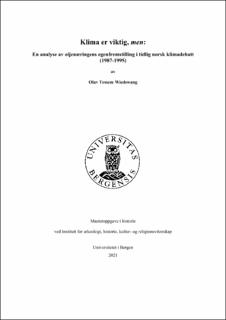| dc.contributor.author | Wiedswang, Olav Tessem | |
| dc.date.accessioned | 2021-06-19T00:09:44Z | |
| dc.date.available | 2021-06-19T00:09:44Z | |
| dc.date.issued | 2021-06-02 | |
| dc.date.submitted | 2021-06-18T22:00:39Z | |
| dc.identifier.uri | https://hdl.handle.net/11250/2760238 | |
| dc.description.abstract | In this thesis, I have researched how the Norwegian oil industry engaged in the early climate debate in Norway between 1987 and 1995. These were the years between the publication of Our Common Future, the final rapport of the UNs World Commission on Environment and Development, and the cancelation of Norway’s first climate-goals in 1995. In 1989, the Norwegian parliament had put for an ambitious goal to stabilise climate emissions. Only six years later, the goal was cancelled, largely because of the rapid growth of the oil industry. Climate change became part of the Norwegian political landscape at the same time as the oil-sector became one of the dominant sectors in the country’s economy. Norway wanted to become a country at the international frontier regarding the battle against climate change, while paradoxically increasingly self-identifying as an “oil-nation”. To understand how the Norwegian oil industry positioned itself in this juncture, I have analysed these companies’ own publications, as well as newspapers and other media where representatives from the oil industry have discussed climate change. The central findings concern how various oil companies presented themselves as agents for sustainable development between 1987 and 1995. The oil companies analysed in this thesis defended their emissions because they could, according to the oil industry itself, reduce emissions in other countries – largely by replacing other fossil fuels with Norwegian gas. This line of reasoning was based on the idea that modern societies were dependent on industry and fossil fuels. Renewable energy and other existing sources of energy such as nuclear and hydro power were presented as ill equipped to sustain the worlds need for energy. Thus, companies that were themselves largely responsible for global warming were seen as best equipped to solve the issue. The goal of this thesis is to shed light on how industrial rhetoric adjusted to a new challenge, and the implications it had for Norway’s goal to become a greener nation. | |
| dc.description.abstract | In this thesis, I have researched how the Norwegian oil industry engaged in the early climate debate in Norway between 1987 and 1995. These were the years between the publication of Our Common Future, the final rapport of the UNs World Commission on Environment and Development, and the cancelation of Norway’s first climate-goals in 1995. In 1989, the Norwegian parliament had put for an ambitious goal to stabilise climate emissions. Only six years later, the goal was cancelled, largely because of the rapid growth of the oil industry. Climate change became part of the Norwegian political landscape at the same time as the oil-sector became one of the dominant sectors in the country’s economy. Norway wanted to become a country at the international frontier regarding the battle against climate change, while paradoxically increasingly self-identifying as an “oil-nation”. To understand how the Norwegian oil industry positioned itself in this juncture, I have analysed these companies’ own publications, as well as newspapers and other media where representatives from the oil industry have discussed climate change. The central findings concern how various oil companies presented themselves as agents for sustainable development between 1987 and 1995. The oil companies analysed in this thesis defended their emissions because they could, according to the oil industry itself, reduce emissions in other countries – largely by replacing other fossil fuels with Norwegian gas. This line of reasoning was based on the idea that modern societies were dependent on industry and fossil fuels. Renewable energy and other existing sources of energy such as nuclear and hydro power were presented as ill equipped to sustain the worlds need for energy. Thus, companies that were themselves largely responsible for global warming were seen as best equipped to solve the issue. The goal of this thesis is to shed light on how industrial rhetoric adjusted to a new challenge, and the implications it had for Norway’s goal to become a greener nation. | |
| dc.language.iso | nob | |
| dc.publisher | The University of Bergen | |
| dc.rights | Copyright the Author. All rights reserved | |
| dc.subject | Klima olje klimapolitikk klimahistorie CO2 Climate climate-policy | |
| dc.title | Klima er viktig, men | |
| dc.title.alternative | Climate is important, but | |
| dc.type | Master thesis | |
| dc.date.updated | 2021-06-18T22:00:39Z | |
| dc.rights.holder | Copyright the Author. All rights reserved | |
| dc.description.degree | Historie mastergradsoppgave | |
| dc.description.localcode | HIS350 | |
| dc.description.localcode | MAHF-HIS | |
| dc.description.localcode | MAHF-LÆHR | |
| dc.subject.nus | 713107 | |
| fs.subjectcode | HIS350 | |
| fs.unitcode | 11-22-0 | |
